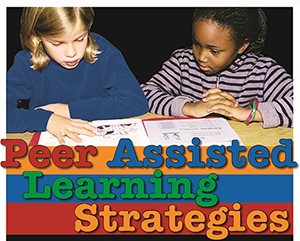By Jenna Somers
 A successful classroom-based reading program designed by researchers at Vanderbilt University is under consideration for a large-scale evaluation in England. Peer Assisted Learning Strategies (PALS) in Reading is a peer-mediated approach that encourages students to practice important reading skills together. A recently funded evaluation of PALS in England, led by Manchester Metropolitan University, found that students engaged in the program made two months' additional progress in reading compared to students who were not in the program.
A successful classroom-based reading program designed by researchers at Vanderbilt University is under consideration for a large-scale evaluation in England. Peer Assisted Learning Strategies (PALS) in Reading is a peer-mediated approach that encourages students to practice important reading skills together. A recently funded evaluation of PALS in England, led by Manchester Metropolitan University, found that students engaged in the program made two months' additional progress in reading compared to students who were not in the program.
Emma Vardy, senior lecturer at Nottingham Trent University; Helen Breadmore, professor at the University of Birmingham; and colleagues at Manchester Metropolitan University completed a study of PALS-UK with 4,800 students ages 9 to 10 across 114 schools. The researchers found that the program improved reading comprehension, oral fluency, and desire to read.
"It is fantastic to see in just 20 weeks improvements in pupils reading comprehension and fluency," Vardy said. "Teachers also observed increased reading stamina in this period. Frequently reading aloud, teachers thought, built up their pupils' confidence, reduced their concerns around the task, and developed a joy of reading. The pupils and teachers reported that children began sharing books with each other and having informal book talks."
The Education Endowment Foundation in England, which funded this study, is now exploring funding a larger trial of the program. Additionally, Vardy and the Welsh government are planning to translate the PALS reading manuals into Welsh for use in schools where children are taught both English and Welsh.
The history of PALS in Reading
PALS may be finding new success in the United Kingdom, but it has a long history in the United States. Very early in their careers, Doug and Lynn Fuchs, research professors of special education at Vanderbilt Peabody College of education and human development, learned about a similar peer-mediated approach to reading and math instruction designed by a research team at the University of Kansas. In this design, children learned more effectively from working together than when they learned solely from the teacher.
Adopting this peer-mediated approach, the Fuchses changed the curriculum and materials to design the PALS program nearly 30 years ago. They collaborated with hundreds of teachers and thousands of students in Metro Nashville Public Schools to research and develop the program. From there, it has expanded to elementary schools throughout the U.S. and Canada, and program materials have been translated into French, Turkish, and Hebrew, among other languages.
Since 2016, the Fuchses and their former student, Kristen McMaster, BS'95, MEd'98, PhD'02, professor of special education at the University of Minnesota, have collaborated with Vardy's British team to adapt the grades 2-6 PALS program materials for use in U.K. educational contexts.
The Fuchses are delighted but not surprised by the success that Vardy's team has seen with PALS-UK.
"The success of PALS Reading is derived from its simplicity," Doug Fuchs said. "It's a feel-good simple program in both the approach and materials offered, building confidence in students and educators. PALS is a notable example of bridging research and practice to improve educational outcomes."






